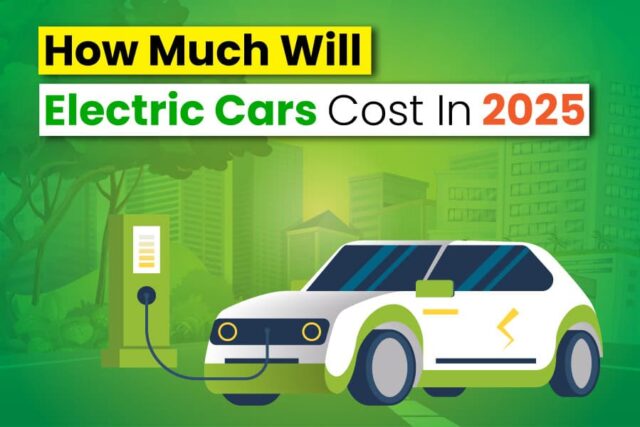Electric cars, they say, are the future. But their prices are making that future that people are dreaming of look bleak. Now, how much will electric cars cost in 2025? Is it going to be cheaper or slightly higher?
Excitingly, every EV makers’ dream is to see electric vehicles take over petrol vehicles. If possible, they would want everyone worldwide to own an electric car.
The cost of buying an EV is the main factor discouraging many people from owning an EV. But the good news is that EV makers are working harder to reduce the prices. They are seeking ways to make electric cars affordable for everyone.
Here, we will discuss how much EVs might cost in 2025 and list some of the best EVs on the market worth considering. Read on for more!
How Much Will Electric Cars Cost in 2025?
The estimated cost of a 200-mile range EV in 2025 is $20,000. That’s what people may have to pay to purchase an electric vehicle in no distant time. But let’s not get ahead of ourselves yet.
We all understand that EV makers are doing all they can to reduce the price of their vehicles. They want to encourage more people to own EVs.
The Economist publication and Goldman Sachs have predicted a significant reduction in the price of EVs in 2025. Goldman Sachs predicted a whopping 40% decrease in the cost of EVs in 2025.
How Much Will Electric Cars Cost In 2030?
The price of electric vehicles has dropped massively over the years. In 2025, the price is expected to fall further as companies move to lower their production cost.
In 2030, EV prices will drop further. We expect electric vehicles to be as cheap as petrol cars. The cost of EVs in 2030 will be lower than in 2025.
A Handy Tip: Countries are already gearing up for a future without petrol cars. The European Union has announced that it plans to scrap petrol cars by 2035.
The United States government hasn’t given a specific date for its plans to stop the manufacturing, sale, or use of petrol cars. However, California and New York have made it clear that they plan to end the use of petrol cars by 2035.
Why Do Electric Cars Cost So Much?
The cost of electric cars is causing people to turn their attention to regular vehicles. Look at the 2024 Tesla Model 3; it costs around $34,122 to $46,520. Some of their cars even cost as much as $110,990.
Now, why is the price of electric vehicles so high? That’s the question many have been asking for years. Here are the reasons.
1: High cost of R&D:
Research and development play a huge role in the advancement of any innovation. It helps manufacturers to take their inventions to the next level. It helps make processes simpler and gives companies a competitive edge.
For EVs, R&D is essential. Without it, many manufacturers will not consider building electric vehicles in the first place.
The cost of research and development is high for EVs. Firstly, EVs have different systems. So, manufacturers have to start from scratch when developing an EV. That’s not the case with regular vehicles.
Manufacturers usually factor the cost of R&D into the prices of their EVs. That’s why many can confidently spend heavily on research and development. They know they’ll eventually get back the funds invested into research.
How do manufacturers get the money they invest in research and development? They spread it around their products. EV makers do the same.
Electric vehicle makers factor in the money they spend on research and development into their vehicles’ cost. But then, since they don’t produce so many cars, the amount factored into the EVs for research and development is usually high.
So, the prices of EVs are high because of the vast amount manufacturers spend on research and development. It would have been better if the manufacturers made more EVs. The prices would have been lower.
A Handy Tip: In 2025 and beyond, more electric vehicles are projected to enter the market. Experts claim EVs will account for over 40% of total vehicle sales by 2030, which isn’t too far away.
EV makers are working hard to produce more EVs, which would help lower their prices. They want to make EV prices in parity with regular vehicles.
2: Number of EV car makers:
When we say “the number of EV manufacturers,” we’re referring to the competition in the industry. It is a simple macroeconomics principle that the fewer the manufacturers, the more expensive a product will be.
The number of EV car makers has increased in recent years, but it’s nowhere near the number of companies making regular vehicles. There are 769 global car and automobile manufacturing companies as of 2024, a -1.4% decrease from what it was in 2023.
On the contrary, the United States of America has 223 hybrid and electric vehicle manufacturing companies as of 2024, a 9.1% increase from what it was in 2022. And there are more than 400 EV makers in the world.
The statistics show that the number of EV manufacturers in the United States of America and the world is increasing. The increase since 2022 has been massive. We hope to see more electric vehicle manufacturing companies enter the fray in the coming years.
A Handy Tip: The increase in EV manufacturers will help increase the competition and drive down the price. People will have many options and likely choose the most durable and affordable brand. They’ll consider price and value before splashing the case.
It will be great to see the number of EV makers increase in 2025 and beyond. Most regular car makers are already showing their interest in electric vehicle manufacturing as the world prepares to fight global warming.
3: The decision of the manufacturers:
EVs are currently very expensive to produce. The batteries, research and development, labor, and materials are expensive. Manufacturers are aware that consumers know EVs are costly to produce. They take advantage of this to inflate the price of their electric vehicles.
An EV that’s supposed to sell for $35,000 will go for $40,000.
The manufacturer knows they’ll profit if they decide to sell for $35,000, but will sell higher because they want to make more profit.
So, most manufacturers’ greed is another factor driving the price of EVs. These manufacturers want to make massive profits by all means. But this can’t happen when there’s high competition in the market, like we have with regular vehicles. Consumers will have more options to choose from and will likely choose the cheaper options.
A Handy Tip: We need more regular car makers to switch to EVs, as they are the future of automobiles. The higher the competition, the cheaper EVs will be.
It won’t happen overnight, but it is doable. The high competition will push manufacturers to lower prices to attract more customers.
4: Effect of economies of scale:
Firstly, what does “economies of scale” mean? It refers to the cost advantage a company reaps when its production becomes efficient or its level of output increases.
In plain terms, the more of something you produce, the cheaper producing each item will be. That’s the meaning of economies of scale.
Economies of scale also have several inputs. For instance, the price of materials reduces when you purchase them in bulk to produce more.
EV makers can reduce the prices of their vehicles by increasing production. Increasing production will encourage the bulk purchase of materials, reducing production costs.
5: Cost of lithium batteries:
Lithium batteries are expensive. They are one of the significant reasons electric vehicles are so expensive. The materials used in manufacturing the batteries and the batteries themselves are costly.
EV lovers can take solace in the fact that the prices of EV batteries have dropped significantly in the last 12 years or so. But that doesn’t mean it is cheap. We hope the price of lithium batteries will fall in the future and become on par with regular batteries.
Regular batteries are way cheaper than the lithium batteries used in EVs. So, until the price of the batteries drops massively, electric vehicles will continue to be expensive.
Most electric vehicle manufacturers purchase their batteries from other companies, while some, like Tesla, spend billions of dollars to produce their own battery cells and packs.
Here is the list of companies producing electric car batteries:
- 3M
- SSAB
- EDF Group
- Samsung SDI
- SK on Co., Ltd
- BYD Company Ltd
- Emerson Electric Co
- JBC Technologies, Inc.
- Saint-Gobain Tape Solutions
- Panasonic Corporation of North America
These are the companies making the batteries for electric vehicles. An increase in the number of EV battery makers will increase the competition and lower the prices of batteries. We hope more companies will start making lithium batteries for electric vehicles soon. It is necessary to drive down the prices of EVs.
6: Most people see electric vehicles as luxury items:
Most people have a unique lifestyle. They like luxury items and are ready to pay a premium without hesitation. These kinds of people wouldn’t mind the price of electric vehicles. They wouldn’t mind spending $100,000 on an electric vehicle.
Because electric vehicles are expensive, their usage is low. Most people cannot afford it.
As long as electric vehicles remain expensive, they’ll remain a luxury that only the rich can afford. But we all know that the tide is changing. The prices of EVs will crash soon and become at parity with regular vehicles.
When EV prices crash, they’ll become as popular as regular vehicles. Most people will no longer see them as a luxury, and manufacturers will stop inflating the cost of their cars to maintain their luxury statuses.
7: Charging an EV requires time and patience:
Electric cars are cheaper to run and manage than regular cars. Of course, electricity is more affordable than gas. However, the time it takes to charge an EV is the major challenge. It could take almost 40 hours to charge and get an electric vehicle ready at a level 1 home charging station.
It costs an average of $1,120 to gas up a regular car for one year, while the average cost of charging an EV for a year is $480. However, you can spend less to charge your electric vehicle if you have a home charger.
Installing a home charge cost around $2000. This fee includes the cost of buying the charger and the installation fee.
Another thing electric vehicle owners have to deal with is finding a public charging station. It’s easier to find a gas station to gas up a vehicle, but that isn’t the case with electric cars.
There are three times more gas stations than public charging stations. So, if your EV battery eventually becomes low, and you’re far away from a charging station, it will cost you extra money to get your vehicle home or the nearest charging station.
Most people don’t factor in these hidden costs of running an electric vehicle. If they do, they’ll understand that EVs are more expensive than the actual price manufacturers place on them.
The number of gas stations in a particular area won’t increase overnight. It will take time. Gas stations didn’t grow in number and spread almost everywhere overnight. It took time. We’re hoping the same thing will happen to EVs. As the prices of EVs reduce and more people start buying them, the charging stations available will increase.
8: The cost of charger and installation:
EVs require approximately 40 hours of charging before hitting the road. That’s approximately two days. Unfortunately, you can’t spend two days charging your electric car at a public charging station.
A home charger is essential, but that would mean spending extra money. A level 2 charger plus the installation would cost around $2000.
Here is what you need to know about electric vehicle charging options. You have three options to charge your car: home charging, public charging station, and fast charging network.
Home charging:
Home charging is the most cost-effective option. It is convenient and easy for EV owners with tight schedules.
The cost per kilowatt hour isn’t the same throughout the day. It might also vary from one location to another, though lower during off-peak periods.
It will cost you $8-$15, depending on electricity rates, to fully charge a 200-mile electric car.
Public charging station:
Public charging is like going to a gas station to fill your tank. But it is cheaper than gas.
The cost of charging an electric vehicle in a public charging station might be the same or slightly higher than home charging. However, most people still prefer home charging because of the convenience.
Public charging stations have different price structures. For instance, while some charge per kilowatt hour, others charge a flat rate per session.
Fast charging network:
If you want to get your electric vehicle charged faster, consider using a fast-charging network. You’ll charge your car in less time, but note that charging costs are higher.
Most charging networks charge per kilowatt hour, while others charge a flat rate per session. Make your inquiries and ask about the cost of charging before proceeding.
9: High insurance cost:
Insuring a vehicle is a personal decision. No manufacturer will ask you to pay for insurance or factor it into the cost of the car. However, insurance is necessary and would be part of the entry cost of purchasing an electric vehicle.
Insuring an electric car costs far more than insuring a regular vehicle. And you can’t blame insurance companies for this. It costs more money to repair or buy materials for an electric car.
The insurance company considers the repair and materials cost when fixing vehicle insurance fees. That is why electric vehicle insurance costs more. Regular vehicles are cheaper to repair. Their materials are also more affordable, so their insurance fees are lower.
For instance, it costs $15,000 to replace the battery of an electric vehicle. Repairing an EV damaged by an accident also costs more than a regular car.
Conclusion
So, how much will electric cars cost in 2025? You can see the projection experts are already making. It is estimated that electric cars will cost around $20,000 in 2025. It will be as cheap as petrol cars.
EV makers are working hard to lower the prices of their vehicles. They want to attract more people by reducing the prices of their cars.
Electric vehicles are expensive for numerous reasons. One of the reasons is the cost of the lithium batteries. However, some EV manufacturers have started making their battery cells and packs. They know that making batteries can help them control and lower the prices of EVs.
The increase in EV manufacturers will also help to crash the price. This will lead to high competition between EV makers and various options from which consumers can choose.














